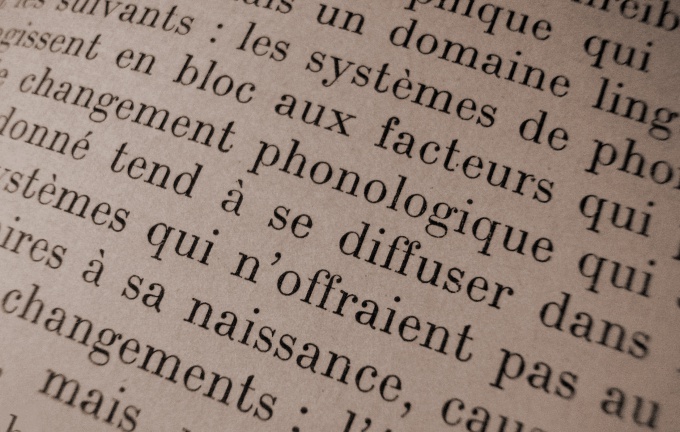This is the sound [œ̃] . But, since its pronunciation is very similar to the sound [ɛ̃], modern linguists have come to terms with the fact that the French pronounce these two different sounds as one, give up on classical phonetics and make life easier for French language learners. It is now believed that these two sounds are pronounced approximately the same: [œ̃] ≈ [ɛ̃]. Therefore, to the letter combinations that form the sound [ɛ̃], we will add two more.
un, um before a consonant, except m, n or at the end of a word: lun di, tribun, brun, parfum
Before a vowel or before m, n(which is typical for all nasal sounds) there is no nasal sound: tribun e (f), brun e
If a word ends with a nasal vowel and is associated with the next word, the nasal vowel is pronounced, but after it there is a consonant [n], which connects the two words:
un͜ élève [œ̃-ne-`lɛ:v], un͜ ami [œ̃-`na-mi]
There is another reason why God himself ordered us to learn to pronounce this sound: the letter combination un is also the indefinite article of the masculine singular, as well as the numeral "one".
ExercisesForreading
1. brun, alun, chacun, quelqu"un, parfum, tribun, lundi, humble;
2. un livre, un peintre, un verbe, un matin, un train, un jardin, un cahier, un mur, un parc;
3. un͜ ami, un͜ acteur, un͜ arbre, un͜ article, un͜ écrivain, un͜ exercice, un͜ aviateur, un͜ architecte, un͜ Américain, un͜ Italien;
4. un - une, brun - brune, chacun - chacune, tribun - tribune, commun - commune, quelqu"un - quelqu"une.
Now let's learn how to pronounce two sounds that are similar to the Russian sound O, but at the same time differ significantly from it. These are the sounds [ɔ]
and [o] .The sound [ɔ] is not in vain reminiscent of a bitten bagel. This sound is much more open than Russian O.
1. The sound [ɔ] is formed by the letter O before pronounceable consonant, except for the sound [z]:
po r te, éco l e, po m me
2. Sound combination au also forms this sound, but only before [r] or at the beginning of a word in prefixes auto. Interestingly, this letter combination is found in French words mainly of Greek origin. And then in the Russian equivalent this letter combination is pronounced as aw:
au rore ( aw rora), auto mobile ( aw car)
1. The [o] sound, on the contrary, is much more closed than the Russian sound O. It is formed by the same letter o, but only at the end of a word or before unpronounceable consonant: numéro, trop
2. O before the sound [z]: ro s e, po s e
3. letter ô also forms the sound [o]: pô le, rô le
4. au before any sound except [r]: au ssi, chau d
5. and finally, if to the letter combination au write a letter in front e, we get the longest letter combination in French eau: beau, chapeau
And the letter combination itself eau means the word and is translated as "water". Does Eau de Cologne mean anything to you?
Well, at the end of this difficult lesson about pronunciation in French, one more rule.
Letter t in the group ti+ vowel is read as [s]: nati o nale, la démocrati e
If before t costs s, letter t read as [t]: la ve s ti aire
Now let’s put our new skills into practice.
ExercisesForreading
1. col, vol, sol, protocole, monopole, discobole, école, donne, bonne, raisonne, tonne, colonne, Sorbonne, personne, gomme, homme, pomme, somme, comme, agronome, économe, astronome, cloche, poche, poste, propre, polonaise, occuper, apporter, telephone, professeur, bibliothèque, politique, effort, octobre;
2. beurre – bord, sœur – sort, cœur – corps, peur – port, seul – sol, peur – pore, leur – lors, fleur – flore;
3. trophée, sophisme, aphorisme, phonographe, philosophie, phonétique, photographe, orthographe, phénomène, phosphore;
4. laure, saur, taure, Minotaure, mauresque, auréole, aurore, lauréat, laurier;
5. notre port, votre place, votre veste, notre directeur, votre fenêtre, notre rue, votre ville, notre professeur, votre chaise, notre père, votre frère;
6. notre͜ école, votre͜ ami, notre͜ usine, notre͜ académie, votre͜ élève, votre͜ image, notre͜ exercise;
7. diplomatie, balbutier, initial, initiative, dictionnaire, vestiaire, réactionnaire, stationner, national, suprématie, questionnaire, modestie, forestier, actionner;
8. mot, dos, gros, lot, pot, sot, héros, zéro, dactylo, stylo, métallo, paletot;
9. pose, chose, dose, doser, arroser, oser, poser, rosier;
10. diplôme, aumône, nôtre, côté, vôtre, trône, tôt, drôle, chômage, rôle;
11. au, haute, faute, gauche, auteur, aussi, chausser, épaule, autre, sauce, saucisse, pause, sauvage, pauvre;
12. beau, seau, eau, tableau, peau, beauté, roseau, morceau, plateau, cadeau.
French speech delights listeners with its beauty and melody. Many of us have more than once had the desire to “speak like the French,” and we frantically grabbed textbooks, dictionaries and phrase books to master this art on our own. But speaking French correctly is a real skill that doesn’t come easily or right away. It is very difficult to acquire French pronunciation, even while studying in courses or individually with a teacher. However, this is not a reason to despair and quit this business. In this article we will try to explain, without complex concepts and terms, how to learn to pronounce some sounds of the French language.
Sound [r]: pronunciation features
Everyone recognizes French speech by the specific sound [r], this is its main distinguishing feature. It is this that poses the greatest difficulty in learning a language. At the same time, it is precisely this that most people associate with “truly” French pronunciation. So, let's learn to pronounce the sound [r] correctly.
There are many different methods to help you get correct pronunciation this “tricky” sound. One of the simplest and most common is gargling with water, and then performing the same actions, but without water. Another effective way– pronunciation of two sounds [g] and [r] together.
Some people believe that when learning sounds, you should follow the rule: the more you repeat, the better it will be. In reality, this is not the case. The main thing is to learn how to position your tongue correctly in your mouth! Since this is the most main mistake, leading to incorrect pronunciation.
Quite often, instead of the beautiful French sound [r], students end up with a slightly wheezing approximate pronunciation. The sound is not as deep as it should be, that is, not quite French.
One sound - two types of pronunciation
The first option is a “silent”, slightly harsh sound [r]. It is quite difficult to pronounce, so words consisting of letters, among which there are two consonants in a row, become a real test for students. This is felt when pronouncing words such as groupe (group), travail (work), promenade (walk), proportion (proportion, ratio), etc.
But the second one is easier to pronounce, it is closer to the original speech. As a rule, this is a combination of the sound [r] with some vowel sound. For example, radis (radish), roche (rock), rime (rhyme), etc.
What's the difference? The fact is that in the two described variants the tongue in the mouth is in different locations. In the first version, it lies flat, resting against the lower teeth, while in the second, the tongue arches, resting its tip UNDER the lower row of teeth. This is a very important feature. After experimenting, you will notice that the position of the tongue changes the pronunciation. Thus, there is no need to spend hours practicing this sound, you just need to understand the principle.

Having figured out the correct position of the tongue, you can move on to consolidating the skills. French sayings with “growling” words will help here. For example, “Mon père est maire, mon frère est masseur” (“My father is the mayor, my brother is a massage therapist”) or “Dans la gendarmerie, quand un gendarme rit, tous les gendarmes rient dans la gendarmerie” (“In the gendarmerie, when a gendarme laughs, all the gendarmes laugh in the gendarmerie."
Vowel sounds [y] and [œ]
The French sound [y] will not be easy to pronounce correctly the first time. If we compare it with the sounds in the Russian language, then it is something between the phonemes [yu] and [u]. Often students pronounce this sound as Russian [у], mistakenly believing that there is no difference. However, this is very important, since incorrect pronunciation of a given phoneme can completely change the meaning of the phrase. Here's an example; “C’est une rue” (This is the street) or “C’est une roue” (This is the wheel).
The above examples are harmless, but there are also comical situations that you can get into by confusing the pronunciation of certain words. For example, “nous” is “we”, and “nu” is translated as “naked”). In order not to make your interlocutors laugh or embarrass yourself, you need to learn to distinguish these vowel sounds and try to pronounce them correctly. Repeating tongue twisters will help with this: “Douze douches douces” and “As-tu vu le tutu de tulle de Lili d’Honolulu?”
Say these phrases and you will notice how clearly you can hear the difference between [u] and [y]. Repeat tongue twisters as often as possible, this will help you soon learn to distinguish these sounds.
In the French language, there is another special vowel sound [œ], the correct pronunciation of which indicates that you are already a true Frenchman. This sound is the middle form between such sounds of the Russian language as [o] and [yo].
How to pronounce this sound correctly? The upper lip needs to be raised up (remember how chimpanzees do this in the wild world). Next, the pen or pencil should be placed on the raised upper lip and clamp, thus fixing this position. Then, carefully removing the stationery from your lip, you should try to pronounce the sound [œ].
To consolidate the result, read the following words several times: acteur, coeur, chaleur, soeur, peur, tracteur, directeur.
Nasal sounds
And finally, let's talk about nasal sounds. Their correct pronunciation is again due to the correct positioning of the speech apparatus. One rule should be remembered: if the sound is [e(n] - “pain”, then the position of the mouth is the same as when pronouncing the sound [ɛ], and not [a]. Students often make mistakes by confusing these sounds. For comparison: center – center.
Here, as in the case of the sounds [u] and [y], the meaning of the phrase depends on the pronunciation (the first word, for example, is translated as “center”, and the second as “hanger”). That's why it's so important to learn how to pronounce them correctly.
In conclusion, it is worth noting that if desired, anything is possible. Having understood the essence of the phenomenon, you can get a wonderful result, so you should always try to understand the main principles. Good luck in your studies!
Instructions
Listen to French speech and pay attention to how the French pronounce the sound "r". Try to imitate them, pronounce French words the same way they do. Please note that, unlike the Russian sound “r”, French is produced not by the tip of the tongue, but by the root.
Straighten your tongue, touch the root of the tongue to the edges of the palate and pharynx. Don't press your tongue too hard on the roof of your mouth - a light touch is enough. Try pronouncing the sound "r" in the French manner. Most likely, you will not do well at first, but regular practice will bear fruit and your pronunciation will improve over time.
Say the word "mine" several times. Pay attention to how you pronounce the "x" sound in this word, and then try saying it on its own. When you can pronounce this sound alone, add your voice and try to pronounce a voiced consonant rather than a voiceless one. You should get the French "r" sound.
Take some water into your mouth, tilt your head back slightly and start gargling. When the water in your mouth begins to gurgle, try pronouncing the sound “g” as in the Ukrainian word “aha”. Then spit out the water and try again making the same vibrating sound you made while gargling. Train regularly until you achieve results.
Regularly record your speech on a voice recorder, and then listen carefully, comparing it with French speech. This way you can record your progress, determine which exercises give you best results, improve your pronunciation. Continue practicing until your “r” starts to sound the same as in French speech.
Anyone who has heard French speech at least once has noticed that the French pronounce the letter “r” (“r”) differently than we do. Moreover, if soviet child As a child, he pronounced the grading “r”, then his parents urgently took him to a speech therapist to correct the defect. And for those who learn French, the situation is exactly the opposite; they must learn to “burr.”
Instructions
"Brushing our teeth"
Smile, open your mouth as wide as possible, and begin brushing your upper teeth. inside tip of the tongue. The tongue should move from side to side.
Open your mouth wide and run the tip of your tongue back and forth across the roof of your mouth. The tongue should return to the beginning of the upper teeth.
"Drum"
Open your mouth and, hitting the upper alveoli of the teeth with your tongue, pronounce the letter “d”.
These exercises must be repeated three times a day, 10-20 times.
There is a technique that allows you to learn how to pronounce “r” in the shortest possible time:
Slowly pronounce the sounds “de”, “te”, “le” without stopping for two to three minutes.
Say the same thing for five minutes, but faster.
Pronounce the sounds “de”, “te”, “de” in the following order: pronounce the first “de” as usual, and the second “de” so that the tip of the tongue touches the tubercle above the upper teeth. You should get a sound that the English pronounce.
Please note
The main reasons for the incorrect pronunciation of “r” may be the following:
1.Shortened bridle. It limits upward movement of the tip and front of the tongue.
2.Weak muscles of the tongue.
3. Inability to speak the language.
4.Weakening of phonemic hearing.
The French language scares many people precisely because of its pronunciation. In writing, a word can consist of 10 letters, of which only half will be pronounced. In addition, the French language differs from English or German in its high cohesion of words, as a result of which it is difficult to isolate individual words from the speech stream. words. So how to pronounce French correctly? words?

Instructions
There are clear rules for reading almost all words in French, so words In French, you rarely find transcriptions. First of all, you need to understand that the accent in all French words x falls on the last syllable. If at the end words you see the letters -s, -t, -d, -z, -x, -p, -g, as well as the combinations ps, ts, es, ds, then they will not be pronounced. Also at the end words When pronouncing, the combinations –ent and er are thrown out. If the letter "s" is at the end words after a nasal consonant, it will also not be read, for example, blanc [blanc] - white.
In addition, unlike the Russian language, voiced consonants in French are always pronounced loudly and clearly, without deafening. Vowels without stress are not dropped or reduced. If there are two identical consonants in a word, then they are pronounced as one sound, for example, classe [class].
The letters "x", "c" and "g" have special pronunciation rules in French. At the beginning words between vowels “x” is read as, for example, inexorable [inegsorable]. If "x" is not at the beginning words, then it will be pronounced like, for example, externe [extern]. In ordinal numbers “x” is read as [z], for example, sixieme [withdrawal]. The letter “c” before the vowels i, e, y is read as [s], for example, certificat [certificate]. In all other cases, this letter will be read as [k], for example, democratie [democracy]. The letter “g” is read as [?] if it comes before the vowels i, e, y, for example, general [general]. In other cases, this letter gives the sound [g], for example, garage [garage].
The French language contains a huge number of letter combinations vowels and consonants. The combination “ch” is read as [?], for example, chance [chance]. The combination “ph” is read as [f], for example, photo [photo]. The combination “qu” is read as [k], for example, banquet [banquet]. The combinations “il” and “ille” after a vowel produce the sound “th”, and after a consonant they are pronounced as “iy”, for example, famille [surnames] or bouillon [bouillon]. Combinations of vowels with the nasal consonants “n” and “m” produce nasal sounds. Letter "t" in words x type national is pronounced as [s], for example, national [national] or initiative [initiative].
Sources:
- French words with transcription
Life is a continuous process of communication. Every day, every person communicates with dozens of people - family, friends, colleagues, partners, employees of various services. And almost everyone is constantly faced with the prospect of giving a speech in front of a small or large audience in a certain situation. Public speaking can be impromptu, but most often it is prepared for.

Instructions
Knowledge of the laws and secrets of proper communication, the basics of speech culture and practice will help you make a successful speech on this or that occasion. The eminent Russian lawyer and brilliant speaker A.F. Koni was convinced that the main thing for any speaker is to attract the attention of the audience and keep it until the end of the speech. This is possible only if the person himself is interested in the subject of speech and is convinced of what he is talking about.
Whatever speech you are preparing for, mentally draw a portrait of the audience you will meet. It is important to know the age (youth, children, pensioners), social status, professional interests, and level of education of your potential listeners. Only with this information in mind will you be able to communicate productively,



